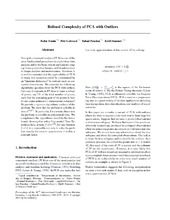Refined Complexity of PCA with Outliers
Peer reviewed, Journal article
Published version

Åpne
Permanent lenke
https://hdl.handle.net/1956/22122Utgivelsesdato
2019Metadata
Vis full innførselSamlinger
Originalversjon
Proceedings of Machine Learning Research (PMLR). 2019;97:5818-5826Sammendrag
Principal component analysis (PCA) is one of the most fundamental procedures in exploratory data analysis and is the basic step in applications ranging from quantitative finance and bioinformatics to image analysis and neuroscience. However, it is well-documented that the applicability of PCA in many real scenarios could be constrained by an “immune deficiency” to outliers such as corrupted observations. We consider the following algorithmic question about the PCA with outliers. For a set of n points in R d , how to learn a subset of points, say 1% of the total number of points, such that the remaining part of the points is best fit into some unknown r-dimensional subspace? We provide a rigorous algorithmic analysis of the problem. We show that the problem is solvable in time n O(d 2 ) . In particular, for constant dimension the problem is solvable in polynomial time. We complement the algorithmic result by the lower bound, showing that unless Exponential Time Hypothesis fails, in time f(d)n o(d) , for any function f of d, it is impossible not only to solve the problem exactly but even to approximate it within a constant factor.